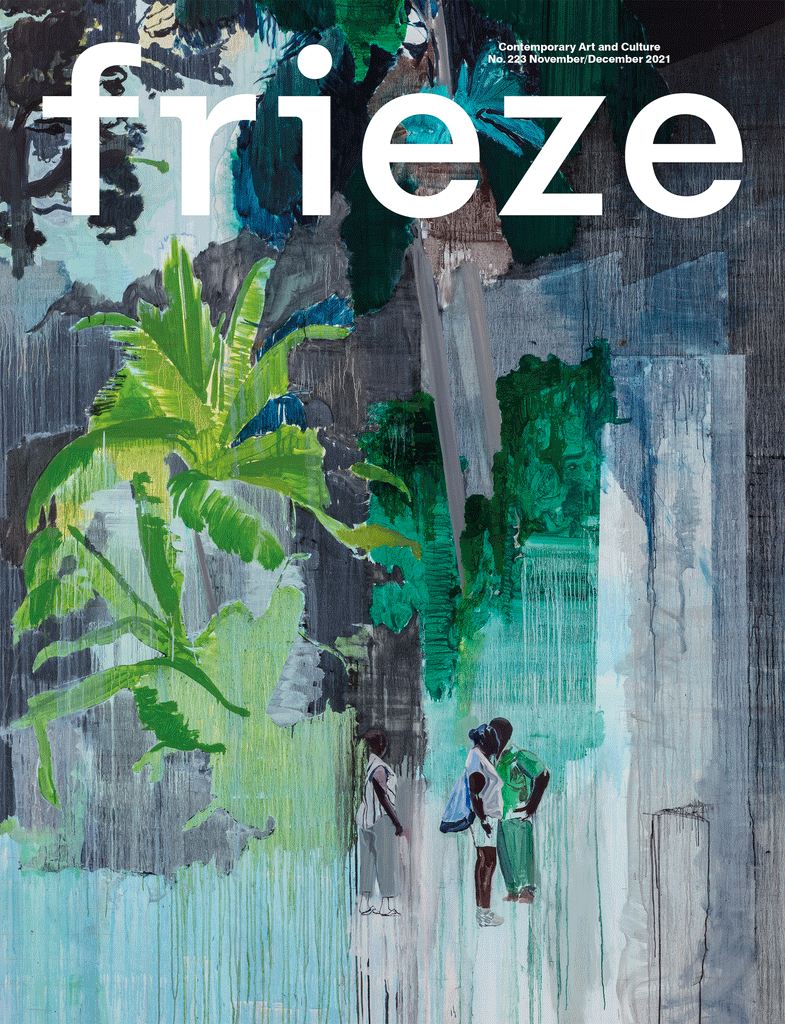
Issue 223
‘I’m trying to get at where these two things – the Caribbean and Britain – overlap or clash. Where they meet or don’t meet.’ – Hurvin Anderson
In the November/December issue of frieze, Hurvin Anderson and Peter Doig discuss Caribbean landscapes and the British imaginary ahead of Tate’s ‘Life Between Islands’ show. And an extended dossier on Black artists working in clay: Theaster Gates speaks to Allie Biswas about the importance of ceramics to his practice; Helen Cammock pens a personal essay about her father, a self-taught ceramicist and art teacher in post-war Britain, who is the subject of her work in the current British Art Show 9; Phoebe Collings-James and Julia Phillips discuss the relationship between clay, their bodies and the world with curator and academic Dr. Jareh Das; and Magdalene Odundo speaks to how travel to Kenya and Nigeria transformed her understanding of ceramics and what it means to be an artist.
Conversation: Hurvin Anderson and Peter Doig
‘I’m trying to challenge my own ideas: do I think that the Caribbean is a perfect place?’ As a survey show exploring seven decades of artistic exchange between the UK and the Caribbean opens at Tate Britain in London, the painters Hurvin Anderson and Peter Doig discuss how the Caribbean – as a place and as an idea – figures in their life and work.
Dossier: Black Clay
‘Working with clay isn’t a one-way conversation: there is this constant potential for movement.’ Drawn from the earth and moulded by the hands, clay has traditionally been marginalized as a craft form. Artists Helen Cammock, Phoebe Collings-James, Theaster Gates, Magdalene Odundo and Julia Phillips reflect on what we might learn from centring ceramics, as well as its politics. They share what brought them to clay and how this medium, malleable and brittle, has shaped them.
Also featuring
Ysabelle Cheung profiles artist and choreographer Eisa Jocson, whose forthcoming book, published later this year, will launch the Rockbund Art Museum ‘Conversations’ series in Shanghai, China. Lucy Ives considers the attachments, repetitions and obligations that define Sophie Calle’s unique approach to something more nuanced than objective truth. And in ‘1,500 words’, Ida Marie Heda evokes Marianna Simnett, fairytales and feminism.
Columns: Second Chances
Kareem Reid examines Black Obsidian Sound System’s community-centered art practice and the legacy of Jamaican sound-system present in their Turner Prize presentation; Jamila Prowse writes about how disability-inclusive resources provide more opportunities for working in the arts. Plus, Renata Lucas reimagines her artworks in the face of bureaucratic obstacles; Dan Fox dives into Michael Bracewell’s account of London in the 1980s to search for signs of the city’s present; and Aria Dean, Calla Henkel, Rene Matic, Frieda Toranzo Jaeger and Yukinori Yanagi answer the question ‘who or what deserves a second chance?’
Plus, artist John Vincler responds to a single work by Thomas Eggerer, Ei Arakawa answers our questionnaire and the next iteration of frieze’s Lonely Arts column.
Subscribe now and explore nearly 30 years of editorial on frieze.com.




